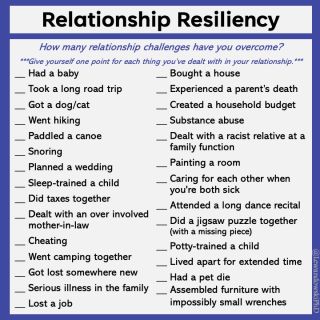Relationships
7 Ways to Make a Relationship More Resilient
Make each other feel heard, and cope together.
Updated October 31, 2023 Reviewed by Tyler Woods
Key points
- Building resilience can help couples have less anxiety, greater well-being, and a healthier relationship.
- Challenges are chances for growth. Arguments can build resiliency, especially if both partners feel heard.
- Resilient couples face challenges as a team, regulate emotions, support each other, and cope together.

Happily ever after.
That’s every couple’s goal, but real-life relationships face challenges. Life happens, with plenty of stresses and strains along the way. Partners get jobs and lose jobs. People get sick. Children get born. In-laws have opinions. Money gets tight. Trust, communication, passion, and conflict come and go. Ups and downs are inevitable.
Too many couples want and expect a perfect relationship. Instead, they should aspire to have a resilient relationship that’s able to withstand whatever life sends its way.
Resilience is better than perfection.
Resilience is the ability to bounce back from difficulties, stress, and hardship (Vella and Pai, 2019). When adversity strikes, resilience is the response that enables positive outcomes despite the initial negative experience.
Grit helps make individuals more resilient. While resilience focuses on what a person does after experiencing failure or struggles, grit focuses on courage and the resolve to put forth effort to achieve a goal, sometimes in the face of adversity (Duckworth, et al., 2007).
Research consistently identifies the benefits of resilience. For example, a recent study found greater resilience was associated with less anxiety and depression, greater life satisfaction, and psychological well-being (Padmanabhanunni, et al., 2023).
Similarly, another recent study reported that more resilient individuals also report better stress management, greater spiritual growth, and better interpersonal relationships (Holden et al., 2023). Resilience is not only good for you but your relationship, too.
Every relationship experiences hardship. However, because of the discrimination LGBTQ+ couples encounter, they are likely to experience more stress and need even greater resilience (Tarantino and Jamison, 2023).
According to recent research, LGBTQ+ individuals who engaged in more relationship maintenance behaviors were more resilient and had better relationship outcomes, such as greater closeness, satisfaction, and commitment (Haas and Lannutti, 2022). Research on heterosexual partners finds similar results, with greater resilience coinciding with higher relationship quality (Rosenfeld and Hausen, 2023). So, what are these behaviors?

7 Ways to Make Your Relationship More Resilient
Resilience isn’t innate. It’s a skill you can build. The same traumatic event doesn’t impact all individuals, or all relationships, equally (Marshall and Kuijer, 2017).
Here are seven ways to help make your relationship more resilient:
- Stay Under Control. Partners need to understand their emotions, identify triggers, and manage them. For example, avoid meaningful discussions when stressed, tired, hungry, under the influence, or distracted/immersed in another activity. Avoid impulsivity. Use positive emotions to short-circuit the negative ones, as research shows it helps (Tugade and Fredrickson, 2004). Better emotional regulation makes you less likely to take things out on your partner.
- Stay Diversified. Your relationship is part of your life, but it should not be your entire life. Instead, you need a variety of outlets, interests, hobbies, and ways of being yourself. Researchers call this self-complexity and find that more ways of defining yourself buffers you from stress (Ryan, et al., 2005).
- Us vs. the Problem. Adopt an “us against the world” mindset. Partners need to remember that they’re on the same team and not going up against each other. Research has found that couples who had the mindset of a united front against an external threat (i.e., COVID-19) were more resilient and had better relationship outcomes (Rosenfeld and Hausen, 2023).
- Use Arguments for Good. Never let a good argument go to waste. Anytime partners have a difference of opinion, it’s a learning opportunity. It’s a chance for each person to be curious about their partner’s point of view. Too often, people try to avoid any form of conflict, when in reality, those arguments help make couples stronger. Challenges are opportunities for growth.
- Feeling Heard. To make your arguments productive, your partner needs to feel heard. That requires you to really listen to their concerns and be able to appreciate the feelings behind it. It’s not just what they’re saying but why they’re saying it that matters. Understand the person to understand the problem. (Learn five steps to being a better listener here.)
- Be There for Each Other. Be a couple who supports each other. But don’t look for acknowledgment or credit for what you do. Instead, help your partner simply because it’s helpful, with no strings attached. Invisible support like this is one of the best ways to help your relationship.
- Cope Together. Stress management needs to be both partners’ responsibility. Dyadic coping involves how couples appraise and deal with stress together (Falconier and Kuhn, 2019). Dyadic coping helps alleviate stress and build resilience, which helps relationships (Xiang, et al., 2022). To cope better as a couple, tell your partner how you feel and take time to appreciate your partner’s support. When your partner is stressed, express empathy by making it clear you’re on their side. Help them analyze the situation and take perspective. They should do the same for you, and you both should do this for the relationship.
You want to feel more empowered in your romantic relationships. To do that, don’t try to have a perfect relationship; have a resilient one. That will allow you to overcome life’s challenges and give your relationship space to thrive.
Facebook image: Max kegfire/Shutterstock
References
Duckworth, A. L., Peterson, C., Matthews, M. D., & Kelly, D. R. (2007). Grit: perseverance and passion for long-term goals. Journal of Personality and Social Psychology, 92(6), 1087–1101. https://doi.org/10.1037/0022-3514.92.6.1087
Falconier, M. K., & Kuhn, R. (2019). Dyadic coping in couples: A conceptual integration and a review of the empirical literature. Frontiers in Psychology, 10, 571. https://doi.org/10.3389/fpsyg.2019.00571
Haas, S. M., & Lannutti, P. J. (2022). Relationship maintenance behaviors, resilience, and relational quality in romantic relationships of LGBTQ+ people. Couple and Family Psychology: Research and Practice, 11(2), 117–131. https://doi.org/10.1037/cfp0000186
Holden, C. L., Rollins, P., & Gonzalez, M. (2023). Health-promoting behaviors, relationship satisfaction, and resilience among a community sample. Contemporary Family Therapy: An International Journal, 45(2), 146–156. https://doi.org/10.1007/s10591-021-09624-3
Marshall, E. M., & Kuijer, R. G. (2017). Weathering the storm? The impact of trauma on romantic relationships. Current Opinion in Psychology, 13, 54–59. https://doi.org/10.1016/j.copsyc.2016.04.013
Padmanabhanunni, A., Pretorius, T. B., & Khamisa, N. (2023). The role of resilience in the relationship between role stress and psychological well-being during the COVID-19 pandemic: A cross-sectional study. BMC Psychology, 11(1), 45. https://doi.org/10.1186/s40359-023-01082-w
Rosenfeld, M. J., & Hausen, S. (2023). Resilience and stress in romantic relationships in the United States during the COVID-19 pandemic” Sociological Science, 10, 472-500.
Ryan, R. M., LaGuardia, J. G., & Rawsthorne, L. J. (2005). Self-complexity and the authenticity of self-aspects: effects on well being and resilience to stressful events. North American Journal of Psychology, 7(3), 431–447.
Tarantino, M. R., & Jamison, T. B. (2023). Resilience through relationship experiences: A qualitative exploration of lesbian, gay, and bisexual romantic development. LGBTQ+ Family: An Interdisciplinary Journal.
Tugade, M. M., & Fredrickson, B. L. (2004). Resilient individuals use positive emotions to bounce back from negative emotional experiences. Journal of Personality and Social Psychology, 86(2), 320–333.


